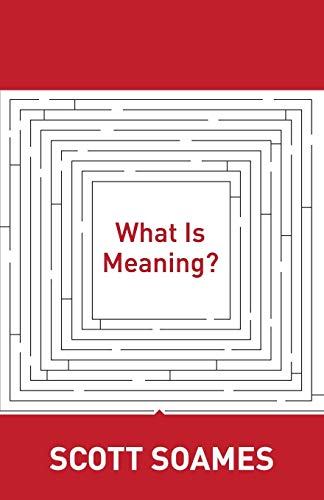Articles liés à What Is Meaning? (Soochow University Lectures in Philosophy)

Synopsis
The tradition descending from Frege and Russell has typically treated theories of meaning either as theories of meanings (propositions expressed), or as theories of truth conditions. However, propositions of the classical sort don't exist, and truth conditions can't provide all the information required by a theory of meaning. In this book, one of the world's leading philosophers of language offers a way out of this dilemma.
Traditionally conceived, propositions are denizens of a "third realm" beyond mind and matter, "grasped" by mysterious Platonic intuition. As conceived here, they are cognitive-event types in which agents predicate properties and relations of things--in using language, in perception, and in nonlinguistic thought. Because of this, one's acquaintance with, and knowledge of, propositions is acquaintance with, and knowledge of, events of one's cognitive life. This view also solves the problem of "the unity of the proposition" by explaining how propositions can be genuinely representational, and therefore bearers of truth. The problem, in the traditional conception, is that sentences, utterances, and mental states are representational because of the relations they bear to inherently representational Platonic complexes of universals and particulars. Since we have no way of understanding how such structures can be representational, independent of interpretations placed on them by agents, the problem is unsolvable when so conceived. However, when propositions are taken to be cognitive-event types, the order of explanation is reversed and a natural solution emerges. Propositions are representational because they are constitutively related to inherently representational cognitive acts. Strikingly original, What Is Meaning? is a major advance.Les informations fournies dans la section « Synopsis » peuvent faire référence à une autre édition de ce titre.
À propos de l?auteur
Scott Soames is professor of philosophy at the University of Southern California. His books include Philosophy of Language, Philosophical Essays, Reference and Description, and Philosophical Analysis in the Twentieth Century (all Princeton).
Les informations fournies dans la section « A propos du livre » peuvent faire référence à une autre édition de ce titre.
EUR 3,85 expédition vers Etats-Unis
Destinations, frais et délaisAcheter neuf
Afficher cet articleEUR 2,26 expédition vers Etats-Unis
Destinations, frais et délaisRésultats de recherche pour What Is Meaning? (Soochow University Lectures in Philosophy)
What Is Meaning? (Soochow University Lectures in Philosophy, 4)
Vendeur : Pomfret Street Books, Carlisle, PA, Etats-Unis
Paperback. Etat : Near Fine. Binding Tight Pages Clean Light Edge Wear. Book. N° de réf. du vendeur 136168
Quantité disponible : 1 disponible(s)
What Is Meaning?
Vendeur : GreatBookPrices, Columbia, MD, Etats-Unis
Etat : As New. Unread book in perfect condition. N° de réf. du vendeur 17852670
Quantité disponible : 2 disponible(s)
What Is Meaning?
Vendeur : GreatBookPrices, Columbia, MD, Etats-Unis
Etat : New. N° de réf. du vendeur 17852670-n
Quantité disponible : 2 disponible(s)
What Is Meaning?
Vendeur : PBShop.store US, Wood Dale, IL, Etats-Unis
PAP. Etat : New. New Book. Shipped from UK. Established seller since 2000. N° de réf. du vendeur WP-9780691156392
Quantité disponible : 1 disponible(s)
What Is Meaning?
Vendeur : Rarewaves USA, OSWEGO, IL, Etats-Unis
Paperback. Etat : New. The tradition descending from Frege and Russell has typically treated theories of meaning either as theories of meanings (propositions expressed), or as theories of truth conditions. However, propositions of the classical sort don't exist, and truth conditions can't provide all the information required by a theory of meaning. In this book, one of the world's leading philosophers of language offers a way out of this dilemma. Traditionally conceived, propositions are denizens of a "third realm" beyond mind and matter, "grasped" by mysterious Platonic intuition. As conceived here, they are cognitive-event types in which agents predicate properties and relations of things--in using language, in perception, and in nonlinguistic thought. Because of this, one's acquaintance with, and knowledge of, propositions is acquaintance with, and knowledge of, events of one's cognitive life. This view also solves the problem of "the unity of the proposition" by explaining how propositions can be genuinely representational, and therefore bearers of truth. The problem, in the traditional conception, is that sentences, utterances, and mental states are representational because of the relations they bear to inherently representational Platonic complexes of universals and particulars. Since we have no way of understanding how such structures can be representational, independent of interpretations placed on them by agents, the problem is unsolvable when so conceived. However, when propositions are taken to be cognitive-event types, the order of explanation is reversed and a natural solution emerges. Propositions are representational because they are constitutively related to inherently representational cognitive acts. Strikingly original, What Is Meaning? is a major advance. N° de réf. du vendeur LU-9780691156392
Quantité disponible : Plus de 20 disponibles
What Is Meaning?
Vendeur : PBShop.store UK, Fairford, GLOS, Royaume-Uni
PAP. Etat : New. New Book. Shipped from UK. Established seller since 2000. N° de réf. du vendeur WP-9780691156392
Quantité disponible : 1 disponible(s)
What Is Meaning? (Soochow University Lectures in Philosophy)
Vendeur : California Books, Miami, FL, Etats-Unis
Etat : New. N° de réf. du vendeur I-9780691156392
Quantité disponible : Plus de 20 disponibles
What Is Meaning? (Soochow University Lectures in Philosophy)
Vendeur : Lucky's Textbooks, Dallas, TX, Etats-Unis
Etat : New. N° de réf. du vendeur ABLIING23Feb2416190102088
Quantité disponible : Plus de 20 disponibles
What Is Meaning? (Soochow University Lectures in Philosophy)
Vendeur : Best Price, Torrance, CA, Etats-Unis
Etat : New. SUPER FAST SHIPPING. N° de réf. du vendeur 9780691156392
Quantité disponible : 2 disponible(s)
What Is Meaning?
Vendeur : Books Puddle, New York, NY, Etats-Unis
Etat : New. pp. 146 Index. N° de réf. du vendeur 2637375407
Quantité disponible : 1 disponible(s)

